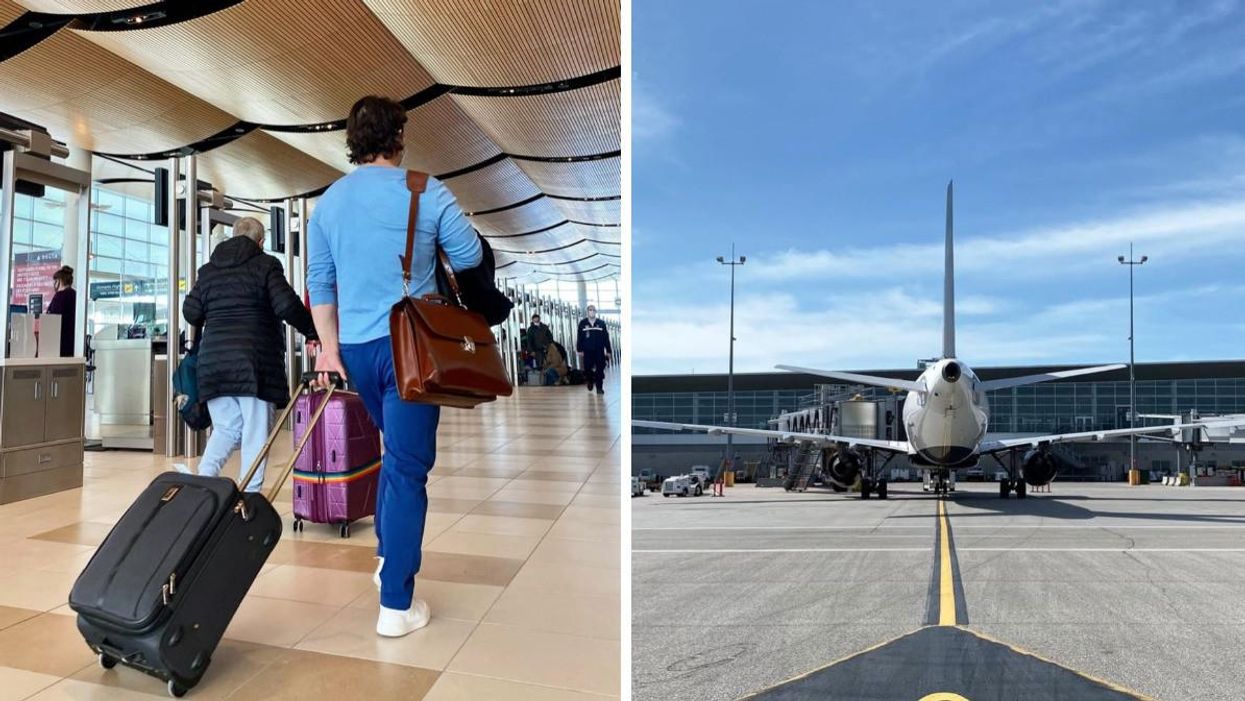Rapid Antigen Tests Are Now Accepted For Travel In Canada But At-Home Tests Are Not Enough
Don't get confused about the rules, travellers! ✈️

A person in an airport. Right: A plane on the runway.
Canada's travel restrictions were recently updated to allow travellers to show a COVID-19 rapid antigen test — rather than a pricer PCR test — but it's not as simple as just taking an at-home test.
Since February 28, fully vaccinated people entering Canada (including Canadians returning home from abroad) have been permitted to use a rapid antigen test result to meet entry requirements.
It means travelling abroad is now cheaper and a little simpler for Canadians as they're no longer required to take a more expensive and harder-to-access PCR test prior to arriving in Canada.
However, if you've got an international trip coming up, it's worth keeping in mind that the new rules are not as simple as taking a rapid antigen test at home.
In fact, there are still multiple rules in place that travellers must follow to meet rapid antigen testing requirements.
Returning home to Canada? \nBefore you head back, get informed and know what to expect at the border. #KnowBeforeYouGo \n\nLearn more https://ow.ly/OrZt50I68x1\u00a0pic.twitter.com/fOjlENdg7S— Canada Border Services Agency (@Canada Border Services Agency) 1646150495
First and foremost, the test must be taken no earlier than the day before you arrive in Canada.
The feds also say that taking a rapid antigen test at home isn't sufficient.
Instead, it must be "authorized for sale or distribution in Canada or in the jurisdiction in which it was obtained" and must also be administered or observed by a professional. This can be through a pharmacy, laboratory, health care entity or telehealth service.
The test must also be performed outside of Canada, which means if you're crossing the border for a short period of time, you can't take the test in Canada before you've left.
It's also worth noting that the pre-entry testing exemption for trips lasting less than 72 hours ended in December 2021.
If you're sticking with a negative molecular result to enter Canada, those tests must be taken within 72 hours before your flight's departure time or your scheduled entry via land or water.
Those using a previous positive molecular test result to meet requirements must have proof from between 10 and 180 calendar days prior to entry.
"A positive antigen test result is never a valid test result for boarding a flight or entry to Canada and can’t be used as proof of a previous infection," reads a government notice.
In February, the federal government also updated Canada's global travel advisory to reflect the changing COVID-19 situation both at home and overseas.
Before you get going, check out our Responsible Travel Guide so you can be informed, be safe, be smart, and most of all, be respectful on your adventure.
This article's cover image was used for illustrative purposes only.